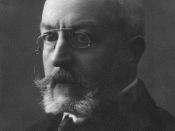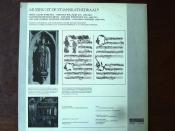Introduction
In 1921, the Belgian historian Henri Pirenne postulated a theory concerning the emergence of towns and trade during the medieval period. Known as Pirenne's Thesis, it challenged the prevailing notion of previous historians such as Petrarch, Niccolo Machiavelli, Edward Gibbon, and others who believed that Germanic influences ended medieval urbanization and subsequently terminated any significant trade between areas of development circa 476 A.D. Instead, Pirenne argued that Muslim forces precipitated the decline of the medieval city in the seventh century. This new historical viewpoint first appeared in Pirenne's posthumously published work Mahomet et Charlemagne in 1937, in which he further claimed in a famous quote "without Islam, the Frankish empire would probably never have existed and Charlemagne, without Mohammed, would be inconceivable."1
After its introduction into the realm of medieval historiography, Pirenne's Thesis dominated for the next four decades, largely due to the fact that history was rather one-dimensional and had not yet expanded beyond its superficial boundaries.
More contemporary analysis now indicates that there may be more than one plausible explanation for the ultimate cessation of medieval civilization. While there are still defenders of Pirenne, there has been an emergence of historians who assert that their earlier colleagues had been correct in pointing to Germanic barbarians as the cause of medieval recession. Other academic scholars blame both the Germans and the Arabs as being responsible for the disruption of trade and growth, or neither one at all. Still others insist that the very concept of trade itself did not emerge until the tenth century A.D., therefore rendering Pirenne's Thesis utterly otiose.
This paper shall examine in depth the myriad interpretations of the Pirenne Thesis, offering critical insight as to the reasons behind medieval diminution (assuming there was any such decline to begin with). Both the supporters and critics...


